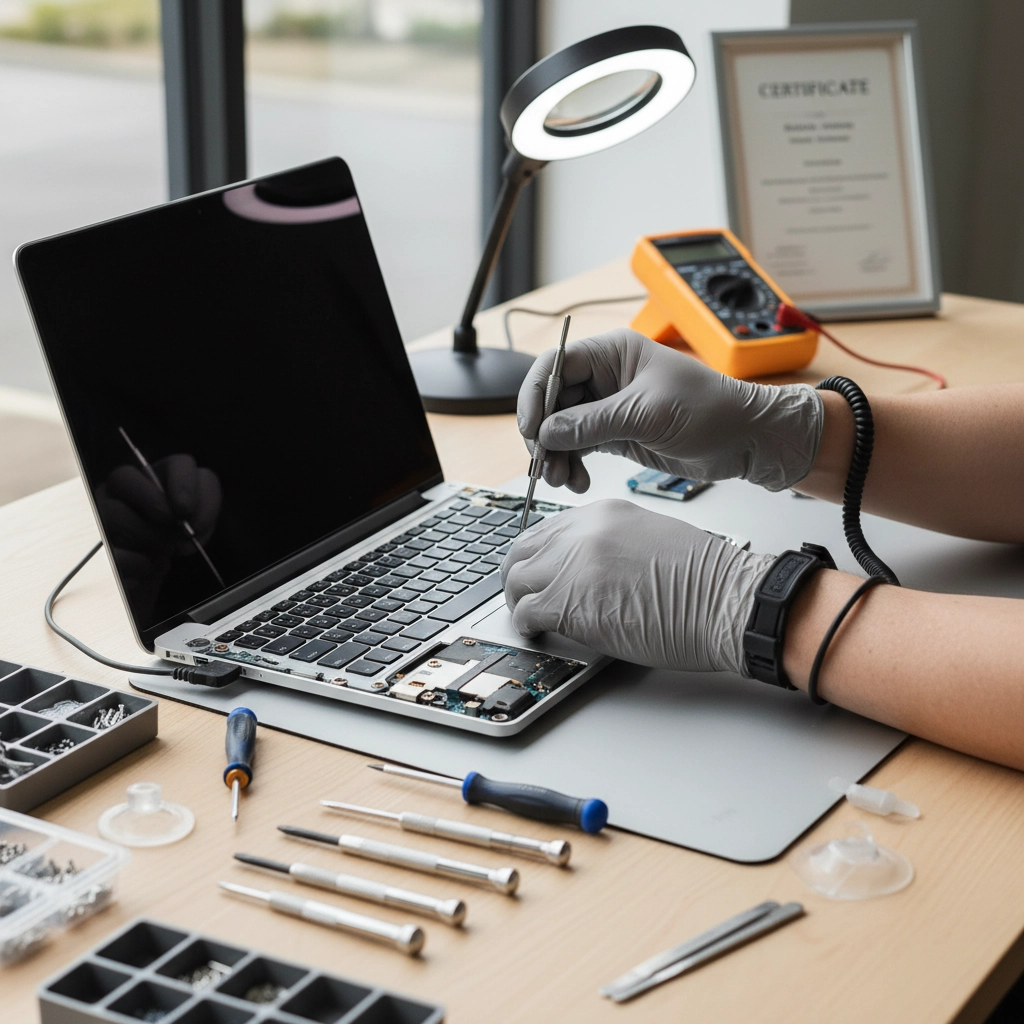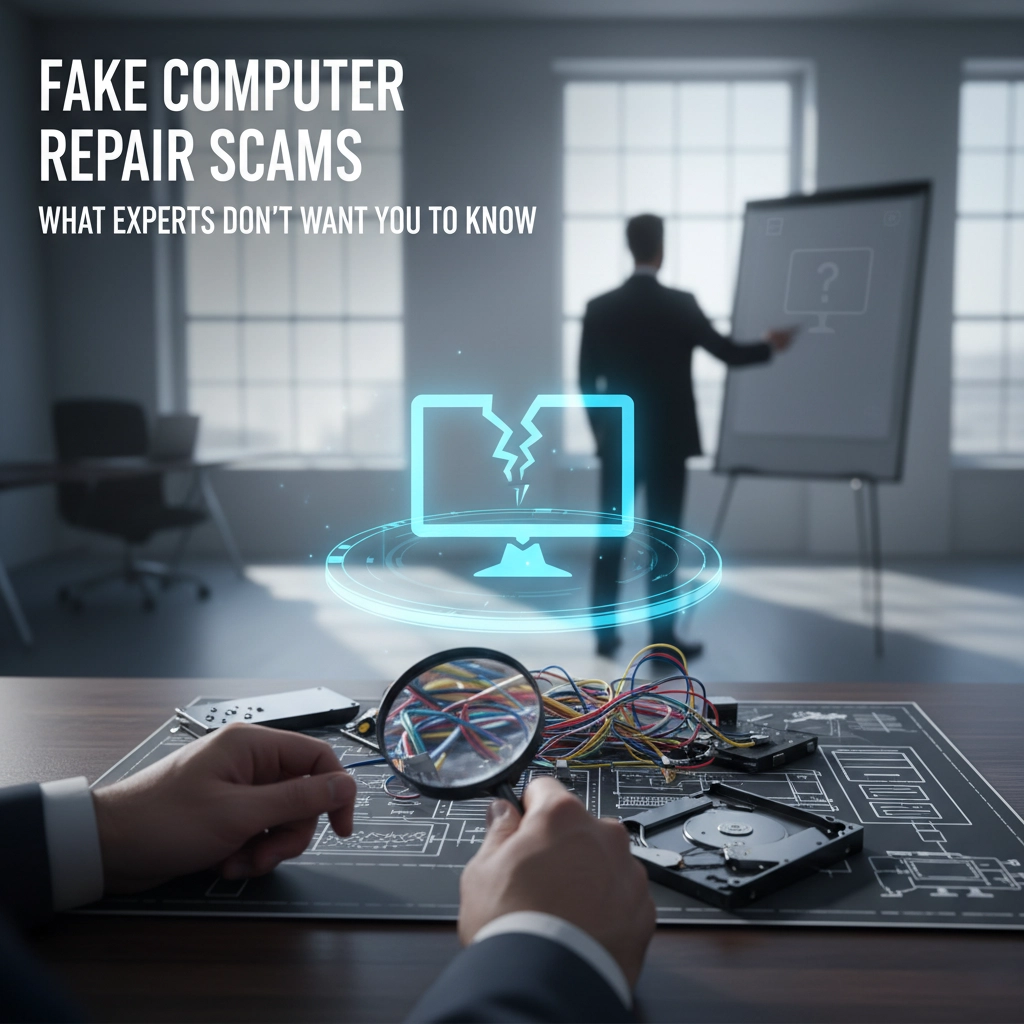Living in Peterborough, you've probably gotten one of those scary phone calls: "This is Microsoft calling about your infected computer." Or maybe you've seen those pop-ups claiming your PC has 47 viruses and you need to call immediately. Here's the truth nobody talks about: these are scams designed to steal your money and personal information.
As someone who's been fixing computers in the Monadnock region for years, I've seen the damage these scammers cause. Let me break down exactly how these cons work and how you can protect yourself and your business.
The Phone Call Scam That Fools Everyone
The most common scam starts with an unexpected phone call. Someone with a thick accent claims to be from Microsoft, Apple, or Norton. They tell you your computer is sending error messages to their servers, or that hackers have infected your system.
Here's their playbook: First, they'll have you open your computer's Event Viewer or Command Prompt. These built-in Windows tools always show warnings and errors: that's completely normal. But scammers use these everyday system messages to "prove" your computer is compromised.

Next comes the real trap. They ask you to download remote access software like TeamViewer or AnyDesk. Once you give them control, they can see everything: your banking passwords, family photos, business documents, everything. Even worse, they install keyloggers that steal your passwords long after the call ends.
The scam ends with them demanding payment for fake computer cleaning services, usually $200-400. They want gift cards, wire transfers, or cryptocurrency: payment methods you can never get back.
Remember this: Microsoft, Apple, and Norton will never call you unsolicited. Ever.
The Local Repair Shop Tricks
Not all scams happen over the phone. Some happen right here in New Hampshire at questionable repair shops. Here are the tricks I've seen:
The "Total Loss" Con
You bring in a laptop with a simple problem: maybe it won't start or runs slowly. The technician disappears into the back room for 20 minutes, then returns with bad news: "Your motherboard is fried. It's a total loss. But I have this refurbished laptop I can sell you cheap."
What really happened? They fixed your original problem in 20 minutes. Now they're selling you an inferior machine while keeping your perfectly good laptop to sell to the next customer.
Parts Theft and Substitution
This one's sneaky. You drop off a computer for repair, and they do fix the original problem. But while they have your machine, they swap out your good RAM, hard drive, or graphics card with cheaper components. You get your computer back "working," but it's actually slower than before.
Protection tip: Before leaving your computer anywhere, take photos of the serial numbers on major components, or ask for a written inventory.
The Unlicensed Software Trap
Some shops offer "great deals" on software installation. They'll put Microsoft Office or Photoshop on your computer for a fraction of the retail price. Sounds good, right?
Wrong. This pirated software often comes loaded with viruses and malware. You'll never receive security updates, and if something goes wrong, you have zero support from the actual software company.

Red Flags That Should Make You Walk Away
Whether dealing with phone scammers or local repair shops, watch for these warning signs:
Unsolicited contact: Legitimate tech support never calls you out of the blue. If someone calls claiming your computer is infected, hang up immediately.
Pressure tactics: Real technicians don't create artificial urgency. Phrases like "Your computer will crash within 24 hours" or "Hackers are accessing your system right now" are scare tactics.
Unusual payment requests: No legitimate business asks for payment via gift cards, wire transfers, or cryptocurrency. If they won't accept a credit card or check, it's a scam.
Free diagnostics with suspiciously low rates: Once you've gone through the hassle of bringing your computer in, you're less likely to take it elsewhere. That's when the "free" diagnostic suddenly reveals expensive problems.
Requests for passwords or personal information: Real technicians fixing hardware don't need your Facebook password or Social Security number.
How Legitimate Computer Repair Actually Works
At Preferred Computer Solutions, we do things differently. When you call us, you're talking to CompTIA certified technicians, not salespeople reading from a script. We never pressure you into unnecessary services or use scare tactics.
Here's how real computer repair should work:
Clear communication: We explain problems in plain English, not technical jargon designed to confuse you. If your computer needs a new hard drive, we'll tell you why and show you the failing component.
Transparent pricing: No surprise fees or hidden costs. We give you a clear estimate before starting any work, and we stick to it.
Respect for your property: We treat your computer and data with the same care we'd want for our own. Your personal files remain private, and we only install software you've requested and approved.
Local accountability: We're part of the Peterborough community. Our reputation depends on treating neighbors fairly, not disappearing after taking your money.

Protecting Yourself and Your Business
The best defense against computer scams is knowledge. Here's how to stay safe:
Initiate contact yourself: If you think your computer has problems, research local repair shops and call them directly. Don't respond to unsolicited calls or pop-up messages.
Verify before trusting: If someone claims to be from Microsoft or Apple, hang up and call the company directly using the official number from their website.
Never give remote access to strangers: Legitimate tech support from major companies happens through official channels, not random phone calls asking you to download software.
Get everything in writing: Before authorizing any repairs, get a detailed written estimate. Any reputable shop will provide this without hesitation.
Trust your instincts: If something feels wrong: high-pressure sales tactics, vague explanations, or demands for unusual payment methods: walk away.
When Your Computer Really Does Need Help
Sometimes your computer genuinely needs professional attention. Maybe it's running slowly, won't start, or you're getting legitimate virus warnings from your actual antivirus software.
When that happens, choose a local business with real credentials and community ties. Look for CompTIA certifications, positive local reviews, and transparent business practices.
At Preferred Computer Solutions, we've been serving the Monadnock region with honest, professional computer repair for years. We work one-on-one with each customer to solve their specific problems: no cookie-cutter solutions or unnecessary upsells.

The Bottom Line
Computer scams work because they exploit our fears and limited technical knowledge. Scammers know most people feel helpless when their computer acts up, so they create fake urgency and offer quick fixes.
The truth is, most computer problems aren't emergencies. That virus pop-up can wait 30 minutes while you verify it's legitimate. Your computer won't explode if you don't call the scary phone number immediately.
Take time to research, ask questions, and choose repair services based on reputation, not fear. Your wallet: and your personal data: will thank you.
If you're dealing with a computer problem and want straight answers from certified professionals who care about the Peterborough community, visit us at www.pcs-nh.com. We'll treat you with the honesty and respect you deserve.
Remember: When it comes to computer repair, if it sounds too good to be true or creates artificial pressure, it probably is. Trust your instincts, do your homework, and choose local professionals who have skin in the game( not scammers who disappear after taking your money.)



Recent Comments